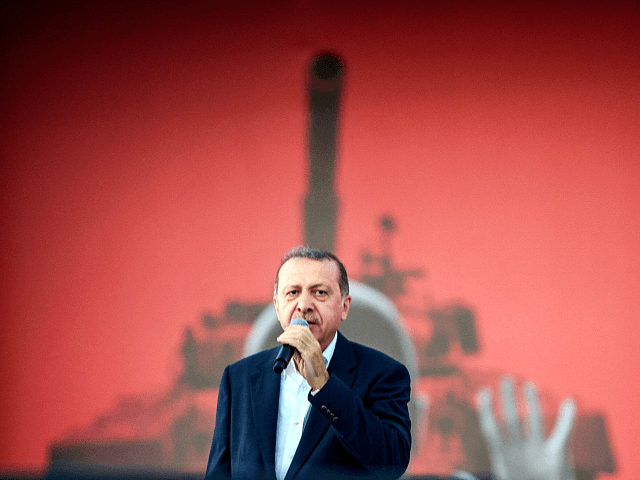Saudi Arabia and Pakistan chose not to attend the Muslim summit convened in Malaysia on Wednesday. The summit was organized largely on the impulse of Turkish President Recep Tayyip Erdogan, who is presiding over the event with Malaysian Prime Minister Mahathir Mohamad.
Erdogan arrived in Malaysia with a sizable entourage, including First Lady Emine Erdogan and most of his top ministers, plus heavyweights from the ruling Islamist AKP Party. Unfortunately for Erdogan’s ambitions, Saudi Arabia chose not to attend, triggering a string of demurrals that culminated in Pakistan bowing out.
Saudi Arabia’s Al-Arabiya found the summit in rather poor shape on Wednesday morning:
Explaining its decision to stay away, Saudi Arabia said the summit was the wrong forum for matters of importance to the world’s 1.75 billion Muslims. Saudi state news agency SPA reported that on a call with Mahathir on Tuesday, King Salman reaffirmed that such issues should be discussed through the Organization of Islamic Cooperation.
Even as delegations were arriving in Kuala Lumpur, Malaysian officials were unable to provide a final list of who would be attending. Mahathir’s office said invitations had been sent to all 56 OIC member states, but officials said only about 20 were sending delegations, and fewer would be led by heads of state.
One Saudi commentator said the summit was intended to further the cause of the Muslim Brotherhood, an Islamist regional group that is classed as a terrorist network by Saudi Arabia, the UAE, Egypt and Bahrain.
Critics saw no good reason to create a much smaller group than the Organization of Islamic Cooperation (OIC) to tackle “divisive issues including the Kashmir region, which is disputed between India and Pakistan, the conflicts in Syria and Yemen, the plight of Myanmar’s Rohingya Muslim minority and mounting outrage over China’s camps for Uighur Muslims in Xinjiang,” to quote Al-Arabiya’s summary of the likely summit agenda. No official list of topics to be covered or final list of confirmed attendees had been released as of Wednesday morning.
On the other hand, obvious bad reasons for the summit would include the above-mentioned push to legitimize the Muslim Brotherhood and Erdogan’s longtime ambition to position himself as the new champion and guiding political force of global Islam – a new “sultan” or “caliph,” as his detractors often put it.
Malaysian Prime Minister Mahathir Mohamad did point out one significant area in which the summiteers have a major difference of opinion with the OIC: China’s abuse of the Uyghur Muslims in Xinjiang province. He made it clear in comments before the summit that he believes the OIC should speak out more forcefully against China on the Uyghur matter.
Iran and Qatar are attending the summit, sending President Hassan Rouhani and Emir Tamim bin Hamid al-Thani respectively, which could be another reason Saudi Arabia and many of its allies stayed away. The official reason given by the Saudis, and conveyed to Mahathir by King Salman bin Abdulaziz in a phone call on Tuesday, is that Riyadh does not wish to undermine the OIC.
Mahathir’s office responded by insisting the summit was not an effort to create “a new bloc as alluded to by some of its critics” and promised the meeting would not become “a platform to discuss religion or religious affairs,” meaning the kind of inter-Islamic feuds likely to erupt between various Sunni blocs and the Iranian Shiite axis when they gather around the same meeting table to hammer out contentious secular issues.
Pakistani Prime Minister Imran Khan contacted both Mahathir and Erdogan to express his regrets for not attending, without going into much detail about why he would not pay a visit to Kuala Lumpur. Khan’s absence was seen as particularly irksome because he discussed the possibility of holding the summit with Erdogan at the U.N. General Assembly in September and publicly accepted an invitation to attend in November.
Pakistani Foreign Minister Shah Mehmood Qureshi conceded on Wednesday that Pakistan responded to concerns from Saudi Arabia and the United Arab Emirates about the summit, specifically that the meeting could cause “division in the ummah” (i.e. Muslims worldwide) and dilute the authority of the OIC.
According to Qureshi, Pakistan worked to address Saudi Arabia’s concerns and even suggested Mahathir fly to Riyadh to personally invite King Salman to the summit, but Mahathir could not work out a schedule for making the trip. Pakistani PM Khan did travel to Saudi Arabia, but his visit was ostensibly intended to resolve some policy differences between the Saudis and Malaysians, rather than persuading the Saudis to attend the summit.

COMMENTS
Please let us know if you're having issues with commenting.